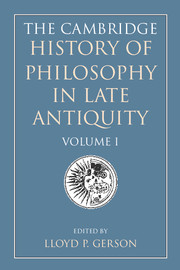Book contents
- Frontmatter
- General introduction
- I Philosophy in the later Roman Empire
- II The first encounter of Judaism and Christianity with ancient Greek philosophy
- III Plotinus and the new Platonism
- Introduction to Part III
- 17 Plotinus
- 18 Porphyry and his school
- 19 Iamblichus of Chalcis and his school
- IV Philosophy in the age of Constantine
- V The second encounter of Christianity with ancient Greek philosophy
- Map 1 The Byzantine Empire, c. 500
19 - Iamblichus of Chalcis and his school
from III - Plotinus and the new Platonism
Published online by Cambridge University Press: 28 May 2011
- Frontmatter
- General introduction
- I Philosophy in the later Roman Empire
- II The first encounter of Judaism and Christianity with ancient Greek philosophy
- III Plotinus and the new Platonism
- Introduction to Part III
- 17 Plotinus
- 18 Porphyry and his school
- 19 Iamblichus of Chalcis and his school
- IV Philosophy in the age of Constantine
- V The second encounter of Christianity with ancient Greek philosophy
- Map 1 The Byzantine Empire, c. 500
Summary
LIFE AND WORKS
The sources available for our knowledge of Iamblichus’ life are highly unsatisfactory, consisting as they do primarily of a hagiographical and ill-informed Life by the sophist Eunapius, who was a pupil of Chrysanthius, who was himself a pupil of Iamblichus’ pupil Aedesius; nevertheless, enough evidence can be gathered to give a general view of his life-span and activities.
The evidence points to a date of birth around 245, in the town of Chalcis-ad-Belum, modern Qinnesrin, in northern Syria. Iamblichus’ family were prominent in the area, and the retention of an old Aramaic name (yamliku-[El]) in the family points to some relationship with the dynasts of Emesa in the previous centuries, one of whose family names this was. This noble ancestry does seem to colour somewhat Iamblichus’ attitude to tradition – he likes to appeal on occasion for authority to ‘the most ancient of the priests’ (e.g., De an. §37), and was plainly a recognized authority on Syrian divinities (cf. Julian, Hymn to King Helios 150cd).
As teachers, Eunapius provides (VP 457–8) two names: first, a certain Anatolius, described as ‘second in command’ to the distinguished Platonic philosopher Porphyry, the pupil of Plotinus, and then Porphyry himself. We are left quite uncertain as to where these contacts took place, but we may presume in Rome, at some time in the 270s or 280s, when Porphyry, on his return from Sicily, had reconstituted Plotinus’ school (whatever that involved).
- Type
- Chapter
- Information
- The Cambridge History of Philosophy in Late Antiquity , pp. 358 - 374Publisher: Cambridge University PressPrint publication year: 2000
- 2
- Cited by



